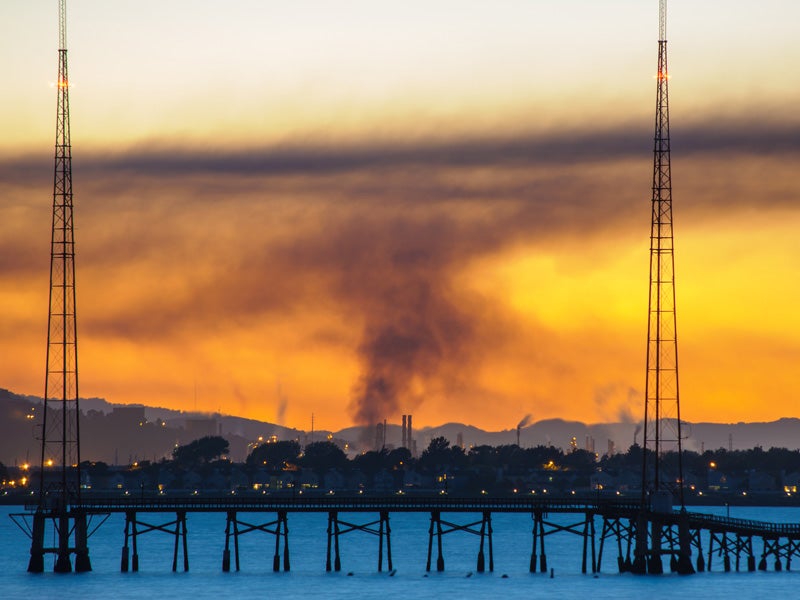Youth Activists Say ‘No’ to Oil Refinery Pollution
Earthjustice sits down with Isabella Zizi, a 21-year-old resident of Richmond, California, to talk about her experience growing up with refineries in her backyard.

This page was published 10 years ago. Find the latest on Earthjustice’s work.
Isabella Zizi is a 21-year-old resident of Richmond, California, an active environmentalist and one of the youngest members of the advocacy group Idle No More SF Bay. Zizi’s background is Northern Cheyenne, Arikara, Muskogee Creek and Italian. Born and raised in Richmond, she witnessed the Chevron refinery explosion in 2012 that sent more than 15,000 people to local hospitals in respiratory distress. We first met at the Bay Area Refinery Healing Walks, a series of walks that highlight the impacts of oil refineries on the Bay Area. Zizi and I spoke about her life growing up in the shadow of refineries and about what a sustainable future could look like.
This month the EPA will finalize long-overdue standards that could help protect communities from toxic oil refinery pollution. These standards would clean up hazardous air pollution, including arsenic, mercury and hydrogen cyanide, known to cause cancer, birth defects, asthma and many other serious health issues. Communities across the country have been in desperate need of more protective standards for years, and the EPA has a responsibility to provide those protections to millions.
This interview has been edited and condensed.
Rebekah Olstad: You live in Richmond, where Chevron has a refinery. What is it like to grow up with a refinery in your backyard?
Isabella Zizi: I adapted to it growing up because I never knew what it was about or what was inside of it. Having witnessed the explosion in 2012, it made me really see the bad that has been going on for so many years. Chevron is in a low-income neighborhood and a lot of my neighbors have asthma or other types of breathing related sickness. I see a lot more of that kind of illness in my community than anywhere else.
RO: What was it like to witness the Chevron refinery explosion?
IZ: It was scary. It was a really beautiful day, then the sun disappeared in seconds and there was huge black smoke. That was really intense for me. I thought it was just a house that had caught on fire, but my mom—she grew up in Richmond, she knew more about it—my mom said, “That was Chevron that exploded.” That just turned on a switch in my brain, like, “What am I supposed to do? What do we have to do?”
Growing up, the schools always told us [in the event of a refinery explosion] to cover any openings, whether it’s your door or your windows, make sure you shut them and you stay inside and that you do not inhale any smoke or anything that’s in the air at the time. I heard some of that stuff when I was a kid in second grade or so. I thought all schools taught that, but now I’m realizing maybe it’s just here.
RO: Can you tell us more about the aftermath of the explosion?
IZ: A lot of people did not know about the Chevron explosion. Some people thought it was just a house fire, so they wanted to be nosy and see what it was. My family had to go around the block and say, “Hey, go inside your house. Chevron just exploded and there are chemicals and toxins in the air that you don’t want to inhale.”
Afterwards, they announced that Kaiser was going to be open to any of the victims who were a part of the explosion. My family went to Kaiser. To be honest, going to Kaiser was kind of a pointless because they had to see over 15,000 people who were affected. It was the quickest thing I had ever done in my life. One doctor checked my pulse, the other one asked, “Is there anything wrong with you? Can you breathe?” The other one said, “Here, keep this paper in case anything happens,” and that was it.
RO: What would you say motivates your activism?
IZ: The kids, especially my little sister. I would rather do all these [environmental] actions so that way in the future we won’t have to worry about it so much. I don’t want my little sister to have to worry about another explosion.
RO: What solutions would you like to see for your community? What would your vision of Richmond look like?
IZ: My ideal for Richmond is to stand up as a community. Where I live is low-income and Chevron actually offers really high-paying jobs, often starting at $20/hr. Everyone wants $20/hr work, but we have to realize, hey, money isn’t always the answer. Is your life more important than this job? You don’t want to work for something that’s causing harm to your community.
I’ve gone to city council meetings and I have seen the community grow together. It’s really great to see that the community does work with each other; it doesn’t matter what our ethnic backgrounds are or how much we make. In Richmond, we’re all a family.
Thanks to Isabella for sharing her story with Earthjustice. Isabella is working to create a youth advocacy group in the Bay Area focused on climate change. Interested youth are welcome to contact her at z_isabella12@yahoo.com.
[Editor’s note: In 2014, after concerted community pressure, the city of Richmond approved an updated version of Chevron’s refinery expansion project, which included much more pollution control than originally proposed and 90 million dollars for community benefits, which may be largest community benefits package for the permitting an oil refinery project in the United States. Click here to learn more about the case.]